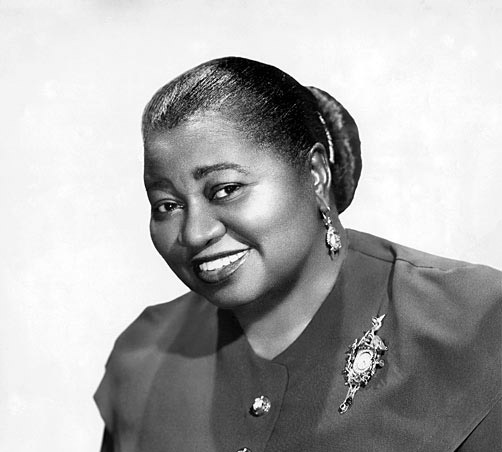Hattie McDaniel (June 10, 1893 – October 26, 1952) was an American actress, singer-songwriter, and comedienne. For her role as Mammy in Gone with the Wind (1939), she won the Academy Award for Best Supporting Actress, becoming the first African American to win an Oscar. She has two stars on the Hollywood Walk of Fame, was inducted into the Black Filmmakers Hall of Fame in 1975, and in 2006 became the first Black Oscar winner honored with a U.S. postage stamp.[3] In 2010, she was inducted into the Colorado Women’s Hall of Fame.[4] In addition to acting, McDaniel recorded 16 blues sides between 1926 and 1929 and was a radio performer and television personality; she was the first Black woman to sing on radio in the United States.[5][6] Although she appeared in more than 300 films, she received on-screen credits for only 83.[7] Her best known other major films are Alice Adams, In This Our Life, Since You Went Away, and Song of the South.
McDaniel experienced racism and racial segregation throughout her career, and was unable to attend the premiere of Gone with the Wind in Atlanta because it was held at a whites-only theater. At the Oscars ceremony in Los Angeles, she sat at a segregated table at the side of the room. In 1952, McDaniel died of breast cancer. Her final wish to be buried in Hollywood Cemetery was denied because the graveyard was restricted to whites only at the time.
Early life
McDaniel, the youngest of 13 children, was born in 1893 to formerly-enslaved parents in Wichita, Kansas.[8][9]: 5, 11, 16–17 Her mother, Susan Holbert, was a singer of gospel music, and her father, Henry McDaniel, fought in the Civil War with the 122nd United States Colored Troops.[10][11]: 4 In 1900, the family moved to Fort Collins, Colorado and then to Denver, Colorado.
Hattie attended Denver East High School (1908–1910). In 1908, she entered a contest sponsored by the Women’s Christian Temperance Union, reciting “Convict Joe”, later claiming she had won first place.[12][10]
Her brother, Sam McDaniel, played the butler in the 1948 Three Stooges‘ short film Heavenly Daze. Her sister Etta McDaniel was also an actress.[13][14]
Career
McDaniel was a songwriter as well as a performer. She honed her songwriting skills while working with her brother Otis McDaniel’s carnival company, a minstrel show.[10] McDaniel and her sister Etta Goff launched the McDaniel Sisters Company, an all-female minstrel show in 1914.[10] After the death of her brother Otis in 1916, the troupe began to lose money, and Hattie did not get her next big break until 1920. From 1920 to 1925, she appeared with Professor George Morrison’s Melody Hounds, a Black touring ensemble. In the mid-1920s, she embarked on a radio career, singing with the Melody Hounds on station KOA in Denver.[15] From 1926 to 1929, she recorded many of her songs for Okeh Records[16] and Paramount Records[17] in Chicago. McDaniel recorded seven sessions: one in the summer of 1926 on the rare Kansas City label Meritt; four sessions in Chicago for Okeh from late 1926 to late 1927 (of the 10 sides recorded, only four were issued), and two sessions in Chicago for Paramount in March 1929.
After the stock market crashed in 1929, McDaniel could only find work as a washroom attendant[18] at Sam Pick’s Club Madrid near Milwaukee.[19] Despite the owner’s reluctance to let her perform, she was eventually allowed to take the stage and soon became a regular performer.[20]
In 1931, McDaniel moved to Los Angeles to join her brother Sam, and sisters Etta and Orlena.[21] When she could not get film work, she took jobs as a maid or cook. Sam was working on a KNX radio program, The Optimistic Do-Nut Hour, and was able to get his sister a spot. She performed on radio as “Hi-Hat Hattie”, a bossy maid who often “forgets her place”. Her show became popular, but her salary was so low that she had to keep working as a maid. She made her first film appearance in The Golden West (1932), in which she played a maid. Her second appearance came in the highly successful Mae West film I’m No Angel (1933), in which she played one of the maids with whom West camped it up backstage. She received several other uncredited film roles in the early 1930s, often singing in choruses. In 1934, McDaniel joined the Screen Actors Guild. She began to attract attention and landed larger film roles, which began to win her screen credits. Fox Film Corporation put her under contract to appear in The Little Colonel (1935), with Shirley Temple, Bill “Bojangles” Robinson, and Lionel Barrymore.





